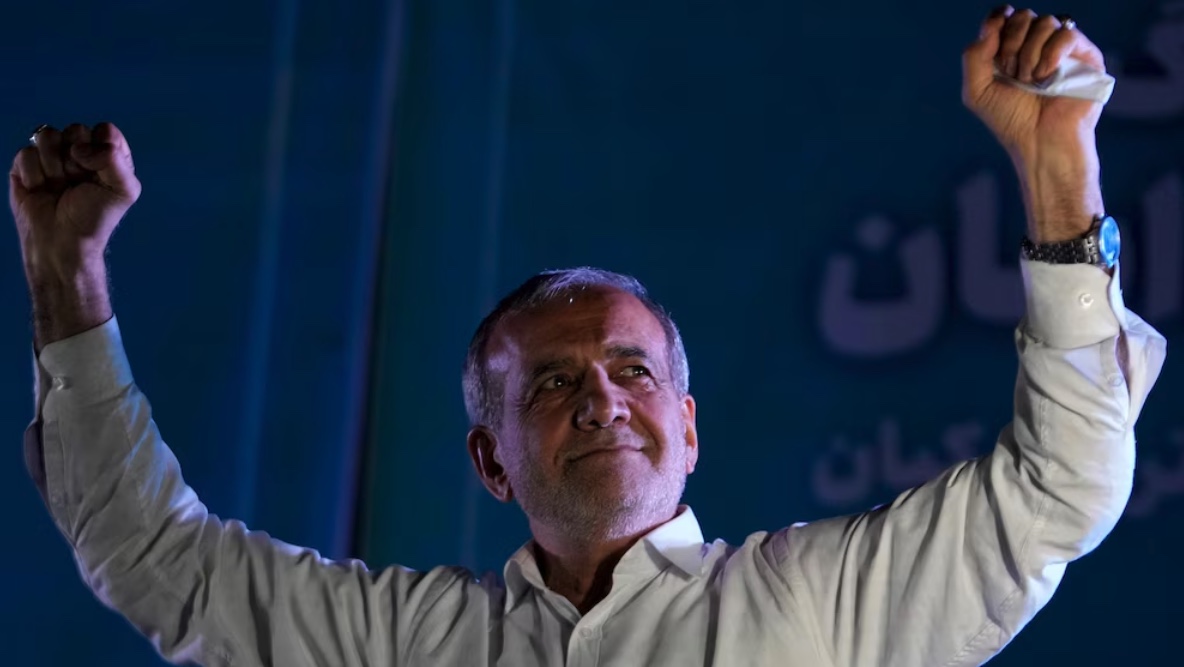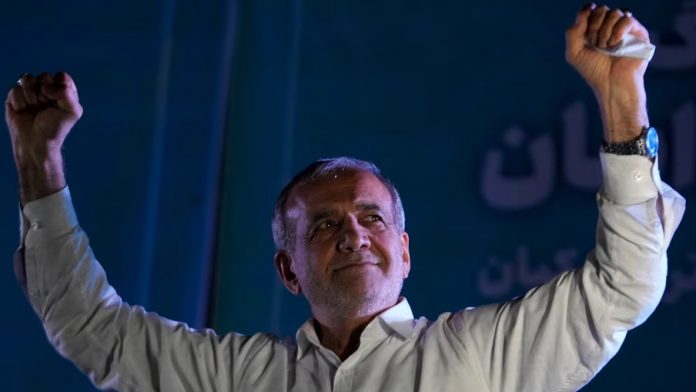Masoud Pezeshkia ได้รับเลือกให้เป็นประธานาธิบดีคนใหม่ของอิหร่าน โดยได้รับคะแนนเสียงมากกว่า 16.3 ล้านเสียงในการเลือกตั้งที่แข่งขันเพื่อต่อต้านฝ่ายตรงข้ามที่แข็งกร้าวของเขา ชัยชนะของเขาซึ่งมีผู้ลงคะแนนเสียงถึง 49.8% เกิดขึ้นท่ามกลางความท้าทายของอิหร่านในเรื่องการแยกตัวจากนานาชาติ ความไม่สงบภายใน และปัญหาทางเศรษฐกิจ แพลตฟอร์มของ Pezeshkian ให้ความสำคัญกับการเจรจาเกี่ยวกับโครงการนิวเคลียร์ของอิหร่านเพื่อจัดการกับข้อกังวลภายในประเทศและความสัมพันธ์ระหว่างประเทศ อดีตรัฐมนตรีกระทรวงสาธารณสุขภายใต้ประธานาธิบดี โมฮัมหมัด คาทามี Masoud Pezeshkia มีชื่อเสียงในฐานะศัลยแพทย์หัวใจที่ผันตัวมาเป็นสมาชิกสภานิติบัญญัติ ซึ่งต่อต้านการปราบปรามผู้ประท้วงเพื่อประชาธิปไตยอย่างแข็งขันในปี 2552 และประณามความโหดร้ายของตำรวจศีลธรรมของอิหร่าน โดยเฉพาะอย่างยิ่งภายหลังการเสียชีวิตอันเป็นที่ถกเถียงของมาห์ซา อามินีในปี 2565 แม้จะมีโศกนาฏกรรมส่วนตัวก็ตาม – อุบัติเหตุทางรถยนต์ครั้งใหญ่ในปี 2537 ซึ่งทำให้ภรรยาและลูกของเขาเสียชีวิต – Pezeshkian ยังคงยืนหยัดอยู่ในแวดวงการเมือง และลงสมัครรับตำแหน่งประธานาธิบดีไม่สำเร็จในปี 2556 และ 2564 ด้วยวัย 69 ปีและมีเชื้อสายอาเซอร์รีและเคิร์ดผสมกัน เขาสนับสนุนชนกลุ่มน้อยของอิหร่าน แต่ต้องเผชิญกับคำวิพากษ์วิจารณ์จากชาวต่างชาติที่ไม่ได้เป็น ผู้พูดภาษาเปอร์เซียโดยกำเนิด
ผู้เชี่ยวชาญแนะนำว่าการดำรงตำแหน่งประธานาธิบดีในระดับปานกลางอาจช่วยลดการเจรจาระหว่างอิหร่านและชาติตะวันตกได้ Pezeshkian พูดเป็นนัยถึงการปฏิรูปสังคมภายในประเทศ ซึ่งเป็นประเด็นสำคัญของการรณรงค์ของเขา แม้ว่าผู้เชี่ยวชาญจะเตือนว่าการเปลี่ยนแปลงดังกล่าวยังไม่แน่นอน Sanam Vakil ผู้อำนวยการโครงการตะวันออกกลางและแอฟริกาเหนือที่ Chatham House ในลอนดอน เชื่อว่าการเปลี่ยนแปลงนโยบายในทันทีไม่น่าจะเป็นไปได้ภายใต้ Pezeshkian เธอตั้งข้อสังเกตถึงความมุ่งมั่นของเขาในการทำงานภายในระบบเพื่อส่งเสริมสภาพแวดล้อมที่มีข้อจำกัดน้อยลง โดยยอมรับขีดจำกัดอำนาจของประธานาธิบดีในอิหร่าน การดำรงตำแหน่งประธานาธิบดีของ Pezeshkian เริ่มต้นท่ามกลางความตึงเครียดที่เพิ่มสูงขึ้นกับอิสราเอลและพันธมิตรตะวันตก เนื่องจากความขัดแย้งในฉนวนกาซาและความก้าวหน้าทางนิวเคลียร์ของอิหร่าน การแลกเปลี่ยนความคิดเห็นระหว่างอิหร่านและอิสราเอลเมื่อเร็วๆ นี้ ควบคู่ไปกับภัยคุกคามที่จะบานปลาย ตอกย้ำถึงพลวัตในภูมิภาคที่ผันผวน ผู้เชี่ยวชาญคาดว่า Pezeshkian จะรักษาจุดยืนของอิหร่านต่ออิสราเอลต่อไป แม้ว่าก่อนหน้านี้เขาจะยกย่องนายพล Qasem Soleimani ผู้บัญชาการกองกำลัง Quds ที่เป็นที่ถกเถียงซึ่งถูกลอบสังหารโดยการโจมตีของสหรัฐฯ ในปี 2563
แม้ว่ารัฐทางตะวันตกไม่ได้คาดหวังว่าการเลือกตั้งจะเปลี่ยนแปลงความสัมพันธ์กับอิหร่านมากนัก แต่ผู้เชี่ยวชาญมองว่า Pezeshkian เป็นผู้สมัครที่พวกเขาชื่นชอบเมื่อเทียบกับฝ่ายตรงข้าม ซึ่งอาจทำให้ความตึงเครียดที่มีอยู่แย่ลง อดีตรัฐมนตรีต่างประเทศ Javad Zarif ซึ่งเป็นพันธมิตรของ Pezeshkian และนักปฏิรูปที่ดูแลความสัมพันธ์ระหว่างประเทศที่ดีขึ้น ถือเป็นผู้สมัครที่มีศักยภาพที่จะกลับไปสู่ตำแหน่งเดิมของเขา Zarifมีบทบาทสำคัญในการเจรจาข้อตกลงนิวเคลียร์ที่มีจุดมุ่งหมายเพื่อจำกัดกิจกรรมทางนิวเคลียร์ของเตหะรานเพื่อแลกกับการบรรเทาการลงโทษ แม้ว่าข้อตกลงดังกล่าวได้พังทลายลงแล้วก็ตาม แม้ว่าเขาจะได้รับความนิยมในหมู่เยาวชนชาวอิหร่าน แต่ Zarif ก็ต้องเผชิญกับคำวิพากษ์วิจารณ์จากกลุ่มหัวรุนแรงในประเทศเกี่ยวกับทัศนคติที่สนับสนุนตะวันตก ผู้นำสูงสุด อยาตอลเลาะห์ ไซเยด อาลี คาเมเนอี วิพากษ์วิจารณ์ผู้สนับสนุนการปรับปรุงความสัมพันธ์ตะวันตกก่อนการเลือกตั้ง Pezeshkian ระบุว่าเขาจะเลื่อนการพิจารณานโยบายต่างประเทศไปที่ Khamenei ทำให้เกิดข้อสงสัยเกี่ยวกับการคืนสถานะของ Zarif
Reformist lawmaker Masoud Pezeshkian wins Iran’s presidential election.

Masoud Pezeshkian has been elected as Iran’s new president, securing over 16.3 million votes in a runoff election against his hardline opponent. His victory, with a voter turnout of 49.8%, comes amidst Iran’s challenges of international isolation, internal unrest, and economic issues. Pezeshkian’s platform prioritises dialogue on Iran’s nuclear program to address both domestic concerns and international relations. A former health minister under President Mohammad Khatami, Pezeshkian is renowned as a heart surgeon turned legislator who staunchly opposed the 2009 crackdown on pro-democracy protests and denounced the brutality of Iran’s morality police, particularly following Mahsa Amini’s controversial death in 2022. Despite personal tragedy—a devastating 1994 car accident that claimed his wife and child—Pezeshkian persisted in politics, running for president unsuccessfully in 2013 and 2021. Aged 69 and of mixed Azeri and Kurdish heritage, he advocates for Iran’s minorities but faces xenophobic criticism for not being a native Persian speaker.
Experts suggest that a more moderate presidency could potentially ease dialogue between Iran and Western nations. Pezeshkian has hinted at introducing some social reforms domestically, a focal point of his campaign, though experts caution that such changes are uncertain. Sanam Vakil, director of the Middle East and North Africa Programme at Chatham House in London, believes immediate policy shifts are improbable under Pezeshkian. She notes his commitment to working within the system to possibly foster a less restrictive environment, acknowledging the limits of presidential authority in Iran. Pezeshkian’s presidency begins amid heightened tensions with Israel and Western allies due to conflicts in Gaza and Iran’s nuclear advancements. Recent exchanges of fire between Iran and Israel, coupled with threats of escalation, underscore the volatile regional dynamics. Experts anticipate Pezeshkian maintaining continuity on Iran’s stance towards Israel, despite his previous commendations of General Qasem Soleimani, the controversial Quds Force commander assassinated by a US strike in 2020.
While Western states do not expect the election to alter their relations with Iran significantly, experts view Pezeshkian as their preferred candidate compared to his opponent, who might have worsened existing tensions. Former Foreign Minister Javad Zarif, an ally of Pezeshkian and a reformist who oversaw a period of warmer international relations, is considered a potential candidate to return to his former post. Zarif was instrumental in negotiating the nuclear deal aimed at limiting Tehran’s nuclear activities in exchange for sanctions relief, though the agreement has since largely collapsed. Despite his popularity among Iranian youth, Zarif has faced criticism from domestic hardliners for his perceived pro-Western stance. Supreme Leader Ayatollah Seyyed Ali Khamenei had criticised advocates for improved Western relations before the elections. Pezeshkian has stated he would defer to Khamenei on foreign policy, casting doubt on Zarif’s reinstatement.
By CNN NEWS

















